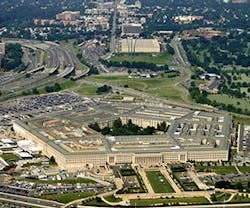U.S. Military Doubles Energy Efficiency Projects
Deployment of clean energy technologies is accelerating across military installations operated by the U.S. Department of Defense, according to The Pew Charitable Trusts.
Pew’s new report, Power Surge, reveals that the number of energy saving and efficiency projects at military installations has more than doubled from fiscal year 2010 to fiscal year 2012, from 630 to 1,339. The number of renewable energy projects increased from 454 to 700 during the same period.
“These improvements are possible even as the Pentagon’s budget is shrinking because the armed services are harnessing private-sector expertise and resources,” said Phyllis Cuttino, who directs Pew’s project on national security, energy, and climate. “This is a win-win-win proposition: The military gets better energy infrastructure, taxpayer dollars are saved, and the clean energy industry is finding new market opportunities.”
The U.S. military incurs a $4 billion energy bill annually operating its bases. To lower energy costs and enhance security, the Army, Navy, Air Force, and Marine Corps have initiated policies and measures to ensure near- and long-term progress in clean energy installation, including the widespread use of third-party financing in which private developers assume responsibility for funding and maintaining projects.
Key findings from Pew’s research are:
- Installation energy security is a top-line priority. Ensuring access to reliable sources of energy and delivering it without interruption to meet operational needs on military installations in the U.S. and abroad is a priority for three reasons: mission assurance, cost savings, and compliance with laws and regulations.
- Leveraging private-sector expertise and financing. Facing budgetary constraints, the U.S. military is working to secure third-party financing to acquire energy infrastructure enhancements and associated energy security benefits at little or no up-front cost. These include energy saving performance contracts and utility energy service contracts, through which the private-sector partner guarantees that the improvements will generate energy cost savings to pay for the project over the term of the contract.
An estimated 80% of future Defense Department renewable energy projects will be financed through power purchase agreements that rely on private developers to finance, build, and maintain projects while saving the military money over the life of the contract. - Clean energy efforts are accelerating. The Department of Defense has made progress toward modernizing its energy infrastructure and realizing the benefits of clean energy technologies.
To read the full report, visit The Pew Charitable Trusts website.
